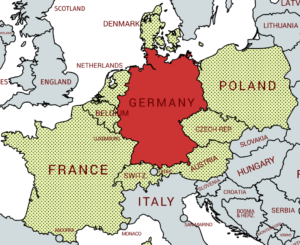Date: September 10, 2024
Country: Germany
Overview:
Germany, located in Central Europe, shares its borders with nine countries, making it a key player in European geopolitics. These borders not only define Germany’s geographical boundaries but also play a significant role in its economic, cultural, and political interactions within the region.

Neighboring Countries:
- Denmark to the north: Separated by the Jutland Peninsula and the Baltic Sea, this border reflects Germany’s historical and economic ties with Scandinavia.
- Poland to the east: The border, defined largely by the Oder-Neisse Line, has been a focal point of historical conflicts and recent cooperation within the European Union.
- Czech Republic to the southeast: This border is marked by a mix of mountainous terrain and rolling plains, highlighting regional trade and cultural exchanges.
- Austria to the south: Shared cultural and historical links, along with a strong economic relationship, characterize this border.
- Switzerland to the southwest: Known for its natural beauty and economic connections, this border is less fortified and reflects Germany’s strong economic ties with Switzerland.
- France to the west: A key partner in the European Union, the border with France is both historically significant and economically vital, marked by the Rhine River in some areas.
- Luxembourg to the west: This small but influential neighbor shares close economic and political ties with Germany.
- Belgium to the west: The border with Belgium features major transportation links and economic interactions, particularly in the industrial regions.
- Netherlands to the northwest: This border, defined by rivers and flatlands, is crucial for trade and transportation between Germany and the Benelux countries.
Geopolitical Significance:
Germany’s extensive borders make it a central hub in European trade and politics. The country’s location facilitates key trade routes and fosters cooperation across multiple borders. Additionally, Germany’s position in the heart of Europe makes it a strategic player in regional security and diplomatic relations.
Conclusion:
Germany’s borders define not just its geographical extent but also its role as a central player in European affairs. Its interactions with neighboring countries are vital for regional stability and economic prosperity, highlighting the importance of its position in the European landscape.











